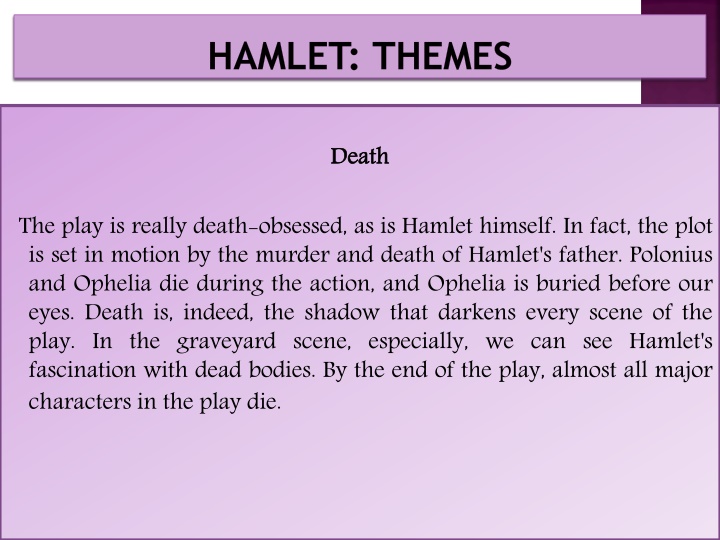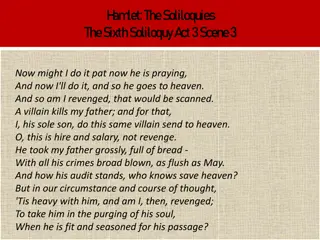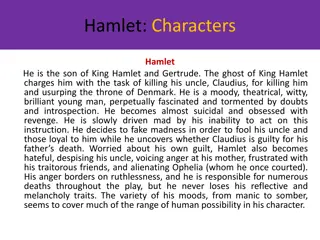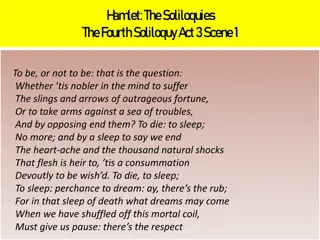Unveiling the Themes of Death, Revenge, Madness, Intrigue, and Women in Hamlet
The play Hamlet delves deep into themes of death, revenge, madness, intrigue, and the role of women. Death shadows every scene, revenge drives key characters, madness ensues, political intrigue abounds, and the role of women is revealed. Explore the complexity of action in this timeless Shakespearean tragedy.
Download Presentation

Please find below an Image/Link to download the presentation.
The content on the website is provided AS IS for your information and personal use only. It may not be sold, licensed, or shared on other websites without obtaining consent from the author.If you encounter any issues during the download, it is possible that the publisher has removed the file from their server.
You are allowed to download the files provided on this website for personal or commercial use, subject to the condition that they are used lawfully. All files are the property of their respective owners.
The content on the website is provided AS IS for your information and personal use only. It may not be sold, licensed, or shared on other websites without obtaining consent from the author.
E N D
Presentation Transcript
HAMLET: THEMES Death Death The play is really death-obsessed, as is Hamlet himself. In fact, the plot is set in motion by the murder and death of Hamlet's father. Polonius and Ophelia die during the action, and Ophelia is buried before our eyes. Death is, indeed, the shadow that darkens every scene of the play. In the graveyard scene, especially, we can see Hamlet's fascination with dead bodies. By the end of the play, almost all major characters in the play die.
HAMLET: THEMES Revenge There are several characters seeking revenge in the play. However, each character goes about their revenge in his or her own way. Some characters rely on the advice of their friends to determine the best way of revenge while others go about it on their own. Below is a list of the characters who seek revenge in the play: 1. Hamlet is seeking revenge on Claudius because he kills his father. 2. Hamlet is also seeking revenge on Rosencrantz and Guildenstern because they betrayed him. 3. Laertes is seeking revenge on his father s murderer, Prince Hamlet. 4. Fortinbras is seeking revenge on King Hamlet.
HAMLET: THEMES Madness Madness is another predominant theme exhibited through some characters in the play. The initial point at which madness is evident is when Hamlet is left to seek revenge upon the murderer of his father. Hamlet feigns madness in order to gain a perfect opportunity to kill the murderer. Ophelia develops a different type of madness created by her love and hate towards everyone in her life, which she develops after the death of her father. Towards the end of the play, Laertes becomes frustrated and angry to hear about the death of his father. His madness is motivated by his anger to seek revenge upon the murderer, Hamlet.
HAMLET: THEMES Intrigue Intrigue Denmark is full of political intrigue. The murder of King Hamlet is the main example of intrigue, but it is not the only one. Polonius spends much time spying on this or that person, checking up on his Laertes in Paris, instructing Ophelia in every detail of her life, hiding behind tapestries to eavesdrop. Claudius, too, is an ineptly intriguing character. He naively invites Fortinbras to march across Denmark with a full army; he stupidly enlists Rosencrantz and Guildenstern as his chief spies; his attempt to poison Hamlet ends in total tragedy. He is little better than Polonius.
HAMLET: THEMES Women Women The presence of only two female characters in the play reveals much about the role of women within it. Both women live in a world that is completely controlled by men. They are both portrayed as weak and lacking in mental capabilities. Hence, they both die tragically because they are caught between fighting men.
HAMLET: THEMES The Complexity of Action The Complexity of Action One of the main themes in Hamlet is how can a person take effective, meaningful and reasonable action. The question is not only how to act, but how one can do so when affected not only by rationality but also by ethical, emotional and psychological factors. When Hamlet does act, he does so blindly, violently and recklessly, rather than with certainty. All the other characters are not so troubled about acting effectively and rather try to just act appropriately.
HAMLET: THEMES The Nation as a Diseased Body The Nation as a Diseased Body Hamlet portrays the sense of anxiety and dread that surrounds the transfer of power from one king to the next. Throughout the play, characters draw clear connections between the moral legitimacy of a ruler and the health of the nation. Denmark is frequently described as a physical body made ill by the moral corruption of Claudius and Gertrude, and many observers interpret the presence of the ghost as a supernatural omen indicating that something is rotten in the state of Denmark . The dead King Hamlet is portrayed as a strong, forthright ruler under whose guard the state was in good health, while Claudius, a wicked politician, has corrupted and compromised Denmark to satisfy his own appetites. At the end of the play, the rise to power of the upright Fortinbras suggests that Denmark will be strengthened once again.
HAMLET: THEMES Religion Religion Religion has a significant impact on the roles and actions of Hamlet and the other characters. Besides some religions markers, there are some dominant religious opinions and thoughts. Hamlet s to be or not to be is interpreted on the lines of his religious thinking about suicide. Suicide is a sin and will take one to hell. He also does not kill Claudius during prayers because he would go to heaven and he does not want to grant him this opportunity. The last comments by Horatio also show the religious expressions in the play, which is also a form of prayer, when he says flights of angels sing thee to thy rest. This means that religion is a strong point in Hamlet even at the end.
HAMLET: THEMES Delay Delay Delay is one of the most striking themes in Hamlet. While trying to establish the crime, Hamlet delays his revenge. He doesn t want an innocent s death on his conscience and wants his action to be justified. He has numerous chances to kill Claudius. He waits until he confirms the crime by staging the play. Once he also finds Claudius praying, and has a perfect opportunity to kill him, but he delays his revenge again. The delay indirectly cost his own life. However, the last conversation with Horatio to leave and show the justification of his cause to the world makes it clear that the intent of delaying was to seek justification.
HAMLET: THEMES Honor Honor Honor is one of the notable themes in the play. Hamlet feels that honor lies in his revenge for his father s murder. However, he always thinks that his honor is at stake if his actions have no justification. On the other hand, Laertes thinks that he will lose his honor if he does not exact revenge for his slain father. In other words, the true honor for both lies in seeking revenge for their fathers though in different ways.























